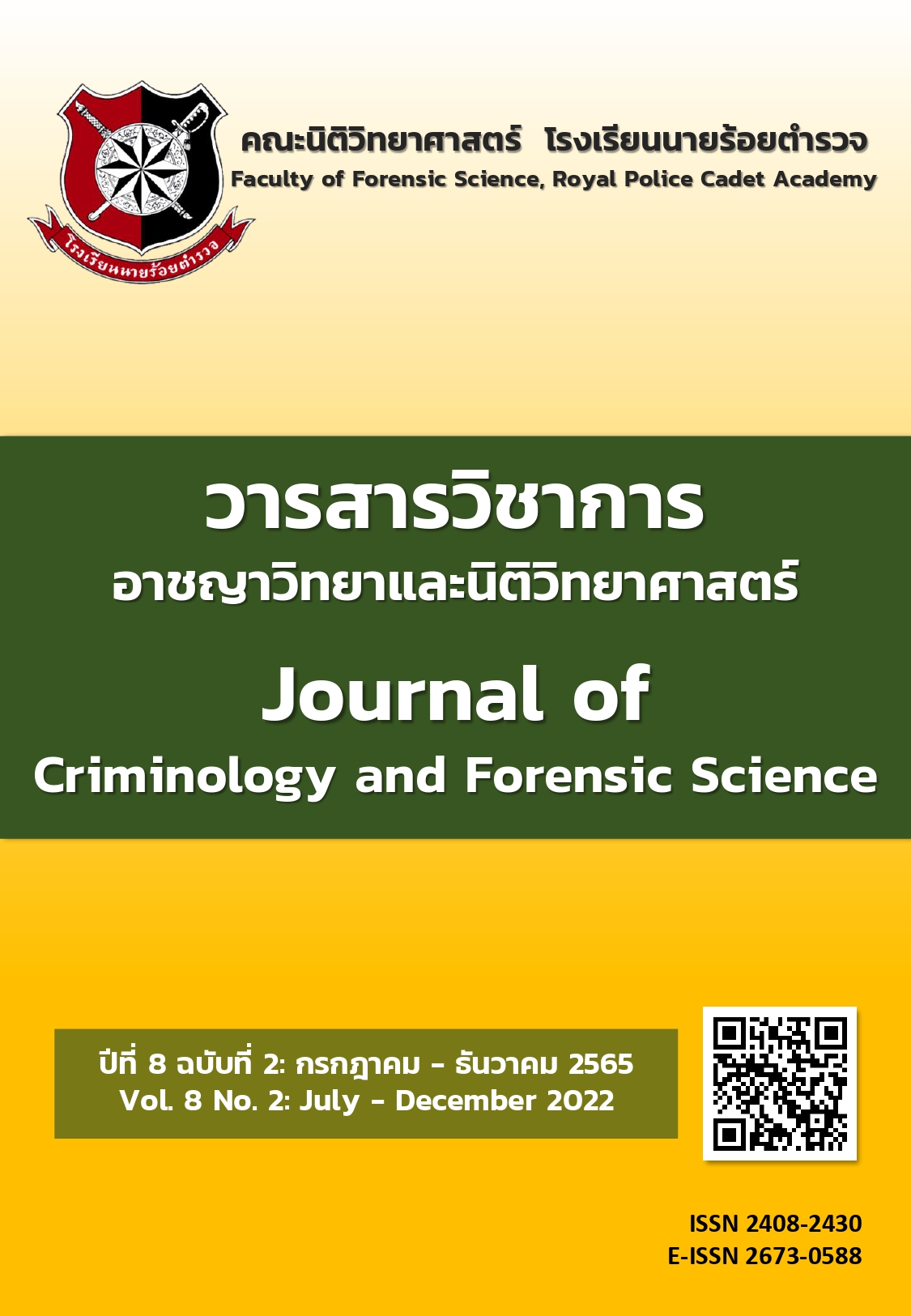ขั้นตอนการปฏิบัติงานในการดำเนินการกับเด็กและเยาวชนที่กระทำผิดเกี่ยวกับยาเสพติดที่มีช่วงอายุแตกต่างกัน
Main Article Content
บทคัดย่อ
การวิจัยนี้เป็นการวิจัยเชิงคุณภาพ มีวัตถุประสงค์เพื่อศึกษาขั้นตอนการปฏิบัติงานในการดำเนินการกับเด็กและเยาวชนที่กระทำผิดเกี่ยวกับยาเสพติดที่มีช่วงอายุแตกต่างกัน ผู้ให้ข้อมูลสำคัญในการวิจัย ได้แก่ (1) การสัมภาษณ์เชิงลึก ผู้ที่มีประสบการณ์ในการดำเนินการกับเด็กและเยาวชนที่กระทำเกี่ยวกับยาเสพติด จำนวน 60 คน (2) การสนทนากลุ่ม เพื่อจัดทำขั้นตอนการปฏิบัติงานในการดำเนินการกับเด็กและเยาวชนที่กระทำผิดเกี่ยวกับยาเสพติดที่มีช่วงอายุแตกต่างกัน โดยทำการคัดเลือกแบบเฉพาะเจาะจงจากผู้เชี่ยวชาญเกี่ยวกับการดำเนินการกับเด็กและเยาวชนที่กระทำผิดเกี่ยวกับยาเสพติดโดยตรง จำนวน 15 คน และทำการวิเคราะห์ข้อมูลเชิงเนื้อหา
ผลการวิจัยพบว่า การดำเนินการกับเด็กและเยาวชนที่กระทำผิดเกี่ยวกับยาเสพติด แบ่งออกเป็น 3 กลุ่มได้แก่ (1) เป็นการดำเนินการกับเด็กอายุไม่เกิน 12 ปี เป็นการดำเนินการตาม พระราชบัญญัติศาลเยาวชนและครอบครัวและวิธีพิจารณาคดีเยาวชนและครอบครัว พ.ศ.2553 มาตรา 69/1 (2) เป็นการดำเนินการกับเด็กอายุเกิน 12 ปี แต่ไม่เกิน 15 ปี มีกระบวนการดำเนินการ 2 กรณี กรณีแรกเด็กถูกจับกุมนำตัวส่งพนักงานสอบสวน กรณีที่สองเข้าพบพนักงานสอบสวนโดยไม่ถูกจับกุมตัว (3) เป็นการดำเนินการกับเยาวชนที่มีอายุเกินกว่า 15 ปีแต่ต่ำกว่า 18 ปี เป็นการดำเนินการตามพระราชบัญญัติศาลเยาวชนและครอบครัวและวิธีพิจารณาคดีเยาวชนและครอบครัว พ.ศ.2553 มาตรา 69 และมาตรา 70
Article Details

อนุญาตภายใต้เงื่อนไข Creative Commons Attribution-NonCommercial-NoDerivatives 4.0 International License.
เนื้อหาและข้อมูลในบทความที่ลงตีพิมพ์ใน วารสารวิชาการอาชญาวิทยาและนิติวิทยาศาสตร์ โรงเรียนนายร้อยตำรวจ ถิอว่าเป็นข้อคิดเห็นและความรั้บผิดชอบของผู้เขียนบทความโดยตรงซึ่งกองบรรณาธิการวารสาร ไม่จำเป็นต้องเห็นด้วยหรือรับผิดชอบใดๆ
บทความ ข้อมูล เนื้อหา รูปภาพ ฯลฯ ที่ได้รับการตีพิมพ์ใน วารสารวิชาการอาชญาวิทยาและนิติวิทยาศาสตร์ ถือว่าเป็นลิขสิทธิ์ของวารสาร วารสารวิชาการอาชญาวิทยาและนิติวิทยาศาสตร์ หากบุคคลหรือหน่วยงานใดต้องการนำทั้งหมดหรือส่วนหนึ่งส่วนใดไปเผยแพร่ต่อหรือเพื่อกระทำการใดๆ จะต้องได้รับอนุญาตเป็นลายลักษณ์อักษรจาก วารสารวิชาการอาชญาวิทยาและนิติวิทยาศาสตร์ ก่อนเท่านั้น
เอกสารอ้างอิง
Chanthong, W. (2014). Measures for the investigation of children and youth who commit criminal offenses under the Juvenile and Family Court Act and the Juvenile and Family Tribunal Act 2010. Ramkhamhaeng Journal of Laws. 3(1), 71-80. (In Thai).
Cherdchoo,P. (2015). The problem of enforcement of special measures instead of criminal prosecution against children and youth. Nonthaburi : Sukhothai Thammathirat Open University. (In Thai).
Chomphunich, N. (2016). The development of the role of investigators in protecting the rights of accused children and youth in criminal cases. Study only the Metropolitan Police Headquarters. Master of Arts Program. Bangkok : Kasetsart University. (In Thai).
Department of Observation and Protection of Children and Youth Ministry of Justice. (2020) Case statistics report for the fiscal year 2020. Bangkok: Strategy and Planning Division. Department of Observation and Protection of Children and Youth. (In Thai).
Hantherdpongchai, S. (2014). LegalProblems in Interrogation of Children at the Interrogation Level. Bangkok: Law Branch Dhurakij Pundit University. (In Thai).
Khundiloknattawasa, S. (2020). Treating a child accused of committing an act that is stipulated by the law is an offense but is under the age of being subject to criminal penalties. Police Cadet Academy Journal. 1 (2), 4-30. (In Thai).
Kittayarak, K., Dechsuriya, C. & Chatpaitoon, N. (2004). United Nations Standards on Criminal Justice. (2nd edition). Bangkok: Foundation. Improving the justice process.
Jaihan, N. (2000).The Role of Psychologists and Social Workers in Child Interrogation in Criminal Cases: Handbook for Conducting Child Interrogation Training and Examination. Nonthaburi: Department of Mental Health, Ministry of Public Health. (In Thai)
Lawyer Center for Human Rights. (2564). Examine the process of juvenile cases When youths are subject to political prosecution, they are more likely to be burdened and abused than adults. (online). Accessed from: https://tlhr2014.com /archives/31315. (In Thai).
Monitoring and Evaluation Section Strategy Office (2021). Narcotics Prevention and Suppression Performance Report for the year 2021. Bangkok: Office of the Narcotics Control Board. (In Thai).
Phothisai, A. (2015). Problems of criminal prosecution in cases where a child or youth is accused of an offence. Junniti, 12 (4), 165-173. (In Thai).
Pianlumlert, C. (2018). Criminal acts of children and youth. and criminal acts against children and youth. (online). Accessed from: http://law.stou.ac.th/dynfiles/Ex. 41716-8.pdf. [2022, 5January]. (In Thai).
Powers, E. and Witmer, H. (1951). An experiment in the Prevention of delinquency: The Cambridge-Somerville Youth Study. New York: Columbia University Press.
Ritthit, W. (2017). Principles of law of litigation in the Juvenile and Family Court. (4th edition). Bangkok: Winy chon. (In Thai).
Ruangrit, P. (2019). Problems of Enforcement of the Juvenile and Family Court Act and Juvenile and Family Court Procedure, 2010. Master of Laws. Bangkok : Sriprathum University. (In Thai).
Sirichatchawanwong, N & Doloh, R. (2018). Problems and solutions for the investigation of arrests in juvenile cases in the jurisdiction of the Juvenile and Family Court of Songkhla Province. The 9th National and International Hat Yai Academic Conference Songkhla: Hat Yai University. (In Thai).
Srikanchanakart, P. (2018). Legal problems related to the investigation of children as the accused. Master of Laws thesis. Faculty of Law. Bangkok: Ramkhamhaeng University. (In Thai).
Teeraphan,P. (2018). Guidelines for the development of diversion cases in the investigation stage where juveniles are offenders. jurisprudence journal Thammasat University. 47(2) : 365- 381. (In Thai).
Wachirapraditphon, O. (2012). Causes of juvenile delinquency and proactive remedial measures. Bangkok: Judicial Training Institute Office of the Court of Justice.
Yodpanya, W. (2561). Legal Development on the Investigation of Children and Juvenile Cases. Journal of Criminology and Forensic Science Police Cadet School. 7(1), 174-185. (In Thai).


